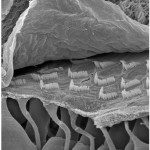SCIENTIFIC POSITIONS
Head of Auditory Therapies Innovation Laboratory at the Hearing Institute (an Institut Pasteur Center), Paris
Professor “Classe Exceptionnelle” at Institut Pasteur, Paris
Professor Emeritus at Collège de France, Chair of Genetics and Cellular Physiology
Since 2022 Head of Auditory Therapies Innovation Laboratory at the Hearing Institute (Institut Pasteur), Paris
2019-2021 Founding Director of the Hearing Institute, an Institut Pasteur center, affiliated to Inserm, Paris
2013-2021 Head of Inserm UMRS1120 Laboratory, Paris University
2008-2020 Head of the Laboratory of Genetics and Physiology of Hearing, Institut Pasteur, Paris
2003-2012 Head of INSERM UMRS587 Laboratory, University Pierre & Marie Curie (UPMC), Paris
2006-2010 Head of the Department of Neuroscience, Institut Pasteur, Paris
1998-2001 Head of the Department of Biotechnology, Institut Pasteur, Paris
1996-2007 Head of the Laboratory of Genetics of Sensory Defects, Institut Pasteur, Paris
1995-2003 Head of CNRS URA 1968, Laboratory of the Mammalian Genome, Institut Pasteur, Paris
1993-1996 Head of the Laboratory of Human Molecular Genetics, Institut Pasteur, Paris
1991-1992 Staff scientist, Laboratory of Human Molecular Genetics, Institut Pasteur, Paris
1985-1990 Staff scientist, Laboratory of Recombination and Genetic Expression, Institut Pasteur, Paris
1983-1984 Postdoctoral scientist, Molecular Genetics Centre, CNRS, Gif-sur-Yvette, France
1982-1983 Postdoctoral scientist, Institute of Immunology, Basel, Switzerland
1976-1981 PhD student, Laboratory of Immunochemistry, Institut Pasteur, Paris
1974-1975 Student, Laboratory of Cellular Genetics (Prof. François Jacob), Institut Pasteur, Paris
1973-1974 Postgraduate medicine student, Faculty of Medicine, Creteil, France.
AWARDS
Gruber Foundation Neuroscience Prize – University of Yale, USA – International (2021)
Doctor Honoris Causa – University of Antwerp (2020)
Louisa Gross Horwitz Prize – University of Columbia, USA – International (2020)
KAVLI Prize in Neuroscience – International (2018)
ARO (Association for Research in Otolaryngology) Award of Merit – USA (2018)
The Inventor Award from Institut Pasteur (2017)
The Hugh Knowles Prize for Distinguished Achievement – USA (2015)
The Brain Prize – Grete Lundbeck Foundation – International (2012)
Pasarow Foundation Medical Research Award “Neuropsychiatry” – USA– International (2012)
Grand Prix INSERM de la recherche médicale – France (2007)
Louis-Jeantet for Medicine Prize – Europe (2006)
Bristol-Myers-Squibb “Freedom to Discover” Award in Neuroscience – USA – International (2005)
Research and Medicine Award, INSERM – France (2004)
L’Oreal-UNESCO: “For Women in Science” Award – Europe (2004)
Ernst Jung-Preis für Wissenschaft und Forschung: Medizin – Germany (2001)
Charles-Leopold Mayer Award – French Academy of Sciences (1999)
Member of EMBO (European Molecular Biology Organisation) (1996)
Janine Courrier Award – French Academy of Sciences (1992)
Medicine Thesis Award (1974)
HONOURS
Commandeur de l’Ordre National du Mérite (2020)
Officier de l’Ordre de la Légion d’Honneur (2014)
Officier de l’Ordre National du Mérite (2011)
Chevalier de l’Ordre de la Légion d’Honneur (2002)
MEMBERSHIP IN ACADEMIES
Member of the Norwegian Academy of Sciences and Letters (2019)
Honorary member of the royal society of otolaryngology and facio-cervical surgery (2019)
Member of the National Academy of Inventors – USA (2018)
International member of the National Academy of Sciences – USA (2016)
International member of the National Academy of Medicine – USA (2011)
Member of the French Academy of Sciences (2002)
Member of the Academia Europae (1998)
Corresponding member of the French Academy of Sciences (1996)
SCIENTIFIC COMMITTEES AND ADMINISTRATIVE RESPONSABILITIES
Member of the Advisory Board of the Gruber Foundation (2023-)
Member of IRCAM (Institut de Recherche et Coordination Acoustique/Musique) scientific advisory board (2020-)
Scientific Council of the Gene Therapy DIM (Domaine d’Intérêt Majeur) (2017-)
Teaching Council of the ESPCI (Ecole Supérieure Physique & Chimie Industrielles-Ville de Paris) (2017-)
Member of eLife’s Board of Reviewing Editors (2016-2020)
Member of the Life Sciences Jury of the L’Oréal-Unesco Awards for Women in Science (2015-)
Member of the Brain Conferences Committee of FENS-Federation of European Neuroscience Societies (2014-)
Section Head of Sensory Systems/Neuroscience at Faculty of 1000 (2011- )
Board of Directors of Minna-James-Heineman Foundation, Germany (2011-2016)
Member of the Scientific Council of the Louis-Jeantet Foundation (2011- 2019)
Member of the COP (Comité d’orientation et de prospective) of UPMC-Paris VI (2011- )
Advisory Committee Member of International Society of Translational Medicine, Beijing, China (2009- )
Member of the COSP (Conseil d’Orientation Scientifique et Pédagogique) of PRES (Pôle de Recherche et d’Enseignement
Supérieur) “Sorbonne Paris Cité” (2010- )
Board of the Scientific Council of the CEA (Commissariat à l’Energie Atomique) (2008-2015)
Board of the Scientific Council of ParisTech (2008-2013)
Board of the Scientific Council of Paris-Descartes University (2008-2010)
Board of the Scientific Council of ENS (Ecole Normale Supérieure) (2008-2010)
Teaching Council of the ESPCI (Ecole Supérieure Physique & Chimie Industrielles-Ville de Paris) (2007-2013)
Member of the ERC (European Research Council) neuroscience panel (2007-2010)
President of the Steering Committee of CTRS/RTRS “Sensory Handicap” (2007- )
Board of Directors of Institut Carnot “Seeing and Hearing” (2006- )
Board of Directors of the Pasteur Institute (2003-2011)
Scientific Committee of Paris City Council (2002-2009)
Scientific Committee for the Institut Universitaire de France Awards (2002-2006)
Association for Research in Otolaryngology (ARO) (1993- ) Program Committee (1998-2001)
Scientific Committee for the IPSEN Awards (1995-2013).





